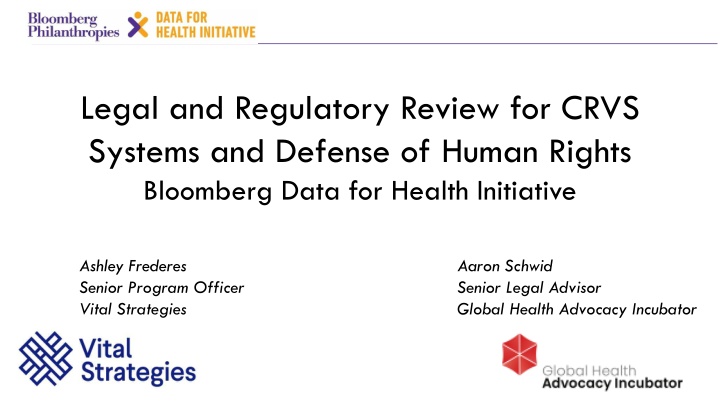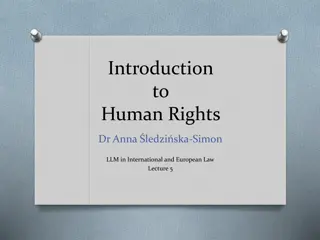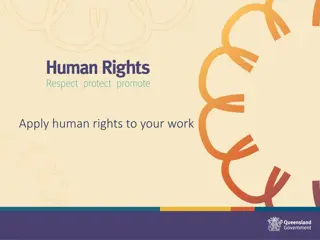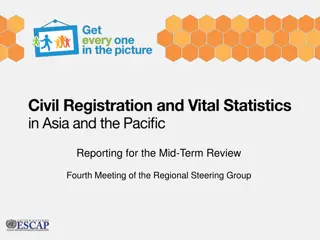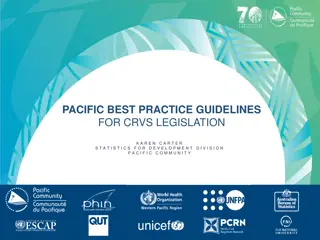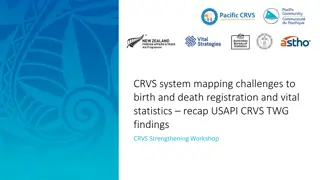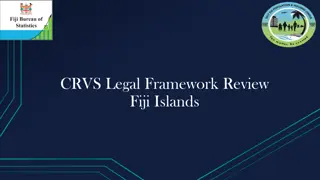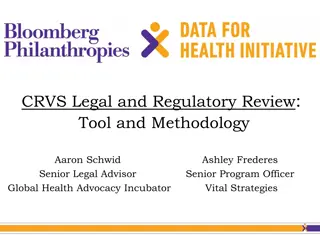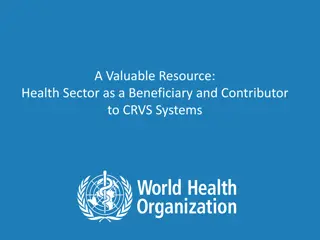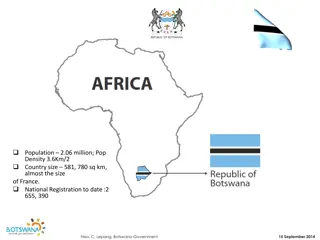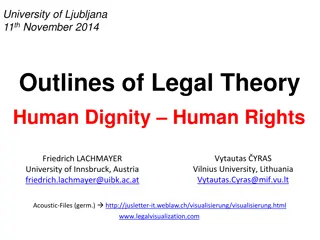Legal and Regulatory Review for CRVS Systems: Ensuring Human Rights
The UN defines CRVS as the continuous, permanent, compulsory, universal recording of vital events. However, CRVS laws tend to be contradictory and unclear. Objective of CRVS legal analysis includes gathering laws, comparing to international standards, identifying issues, and proposing solutions with stakeholders. The Assessment Tool provides guidance on best practices for legal analysis in CRVS systems. Main areas covered include civil registrar structures, data security, registration processes, and vital statistics production.
Download Presentation

Please find below an Image/Link to download the presentation.
The content on the website is provided AS IS for your information and personal use only. It may not be sold, licensed, or shared on other websites without obtaining consent from the author.If you encounter any issues during the download, it is possible that the publisher has removed the file from their server.
You are allowed to download the files provided on this website for personal or commercial use, subject to the condition that they are used lawfully. All files are the property of their respective owners.
The content on the website is provided AS IS for your information and personal use only. It may not be sold, licensed, or shared on other websites without obtaining consent from the author.
E N D
Presentation Transcript
Legal and Regulatory Review for CRVS Systems and Defense of Human Rights Bloomberg Data for Health Initiative Ashley Frederes Senior Program Officer Vital Strategies Aaron Schwid Senior Legal Advisor Global Health Advocacy Incubator
The UN defines CRVS as the: Continuous Permanent Compulsory Universal recording of the occurrence and characteristics of vital events
But CRVS laws tend to be: Continuously Contradictory Permanently Poorly-Written Compulsively Complicated Universally Unclear
Objective of CRVS Legal Analysis Gather complete collection of laws related to CRVS Compare current laws to international standards Find problem areas and gaps in current legal framework Brainstorm possible solutions with stakeholders Divide solutions into those that require legislative changes and those that can be fixed with existing regulatory authority Support government to enact desired legal improvements
The Assessment Tool Self-taught tool designed for attorneys with limited to high knowledge of CRVS systems Provides concise explanation of 42 international best practices and guidance for analyzing each Designed to balance depth, comprehensiveness, ease-of-use and speed
The Assessment Tool 42 best practices and principles with guidance Which are covered by law? Which are covered by regulation? Where is there alignment and where are there gaps? If gaps, can they be quickly patched by the agencies, or are legislative or other processes required?
Main Areas Covered Enabling environment Structure of Civil registrar Technology & data security Key issues with registration of birth, death, and foetal death Key issues with certifying of cause of death Production of vital statistics
International Best Practices United Nations, Handbook on Civil Registration and Vital Statistics Systems Preparation of a Legal Framework, 1998 United Nations, Principles and Recommendations for a Vital Statistics System, 2014 World Health Organization, WHO Resource Kit: Strengthening civil registration and vital statistics for births, deaths and causes of death, 2010 Pacific Community, Legislation for Civil Registration and Vital Statistics in the Pacific: Best Practice Guidelines and Examples 2016
International Obligations Universal Declaration of Human Rights Declaration on Rights of the Child Convention of Reduction of Statelessness International Convention on the Elimination of All Forms of Racial Discrimination International Covenant on Civil and Political Rights Many more
Depth of Law Implicated Constitution Court decisions Laws/Statutes Administrative instruments (eg regulations, decrees orders, SOPs)
Breadth of law implicated Government Administration Constitution Government Organization Civil Procedure and Civil Code Local Government Administrative Procedures Criminal Procedure and Penal Code Local Autonomy Laws Budget Code of Conduct of Government Officials Initial Information Collection Individual or Family Registration Paternity Hygiene and disease prevention Burial and Cremation Nationality Residence registration Education or student registration Civil Information Management Public security law Information Management Personal Information Protection Electronic Government Telecommunications Digital Signature Notary Offices Certificate of Seal Imprint Judicial Enforcement Medical Procedures and Rules Medical School curriculum Government hospital manuals Medical Board Training Requirements and Procedures Coroner or Autopsy or Inquest Statistics and Other Secondary Uses Statistics or Censuses Heritage and basis of Inheritance Education National and Local Tax Collection Military Service National Health Social Security Emigration and Immigration Voting and Elections Registration of Real Estate Labor Other considerations Religious freedom Human rights Protection of rights of children Protection of rights of women Specific diseases such as HIV/AIDS Drugs and medical products
Who Benefits? Public Easy, quick, free, universal registration Exercise individual benefits of registration CRVS Clear, efficient, and cost-effective procedures High-quality data Nat'l Gov't Clear delineation of roles Smooth government interactions Other Gov't Agencies Reliable validation for ID, immigration, voting, education, pensions, driving, police and more Private Companies Confidence in customers' identity Health Sector Access to quality statistics data Legal application of verbal autopsy
Options following a legal analysis Revise operating procedures and training manuals without fear of violating law Issue or amend sub-decrees and regulations Support revision of CRVS legislation Encourage amendment of related law or regulations Produce new registration forms and/or introduce international standard MCCOD form
Illustrative Results to Date Tanzania: Draft Birth, Death and Divorce bill introduced by Government Colombia: Consolidating >100 CRVS regulations Ghana: MOU between health sector and Civil Registrar to permit data sharing Rwanda: Sub-decree authorizing health facilities and CHWs as registration points and notifiers
Questions? https://www.bloomberg.org/program/public- health/data-health/ www.crvslaws.org Ashley Frederes Afrederes@vitalstrategies.org Aaron Schwid Aschwid@advocacyincubator.org
